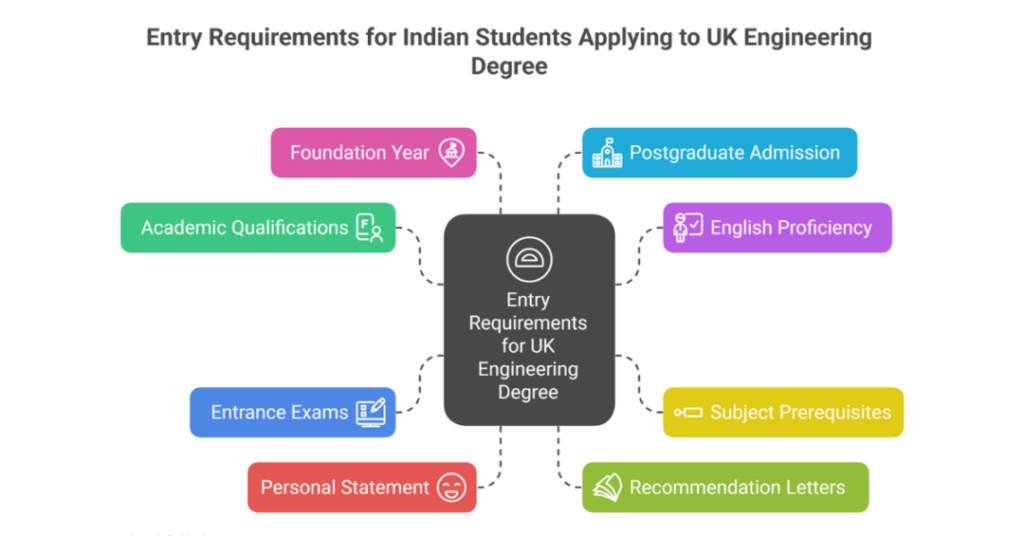9 July 2025
7 minutes read
10 Best Engineering Universities in UK for Indian Students

Key Takeaways
- The best engineering universities in UK like Cambridge, Oxford, and Imperial offer globally ranked programs across engineering disciplines with strong career outcomes.
- Indian students should prepare with 75–90% scores, IELTS 6.5+, and a standout profile to meet competitive entry requirements and secure top scholarships.
- With smart budgeting, scholarships, and post-study work visas, building a successful engineering career in the UK is both achievable and rewarding.
Over 55,000 Indian students choose to study in UK each year, yet many struggle to find the best engineering universities in UK that truly align with their goals. With hundreds of options and buzzwords like engineering science, civil engineering, and mechanical engineering thrown around, it’s overwhelming.
The truth? Not all engineering courses in the UK are equal. But with clarity on rankings, engineering disciplines, and what top schools like Imperial College London actually offer, you can choose smarter and build a real engineering career.
Why Indian Students Choose the UK for Engineering Studies?
Indian students choose the UK to study engineering because it offers the best engineering universities in UK with global rankings, cutting-edge engineering programmes, and diverse branches of engineering like civil engineering, electrical engineering, mechanical engineering, and aerospace engineering.
Top names like the University of Cambridge, Imperial College London, and University of Manchester attract international students for their world-class engineering education for higher studies in UK, engineering science courses, and real-world exposure, paving the way for a successful engineering career as an engineer in the UK.
Top 10 Universities for Engineering in UK for Indian Students
UK universities consistently feature in the world university rankings for engineering, making them a top choice for engineering students from India. From chemical engineering to computer engineering and nuclear engineering, the UK offers diverse types of engineering courses taught at globally recognized institutions.
If you’re looking for the best engineering universities in UK that align with global top rankings, strong industry connections, and research excellence, this curated list is exactly what you need.
1. University of Cambridge
Home to one of the oldest and most prestigious departments of engineering science, Cambridge University offers a broad engineering education through its Meng in Engineering Science program. With a reputation among the best engineering schools in the world, it excels in design engineering, process engineering, and structural engineering.
2. University of Oxford
Oxford blends academic depth with innovation in its School of Engineering Science. Recognized in the Sunday Times Good University Guide and world university rankings, its interdisciplinary focus covers environmental engineering, engineering and mechanical engineering, and electronic engineering.
3. Imperial College London
Ranked consistently among the top engineering universities in the UK, Imperial’s Faculty of Engineering leads globally in electrical and electronic engineering, chemical engineering, and aerospace engineering. Its central London campus also offers great networking and career opportunities.
4. University College London (UCL)
UCL’s engineering degrees in the UK are known for innovation and real-world impact. Its engineering and technology curriculum includes specializations like computer engineering, nuclear engineering, and engineering design, making it one of the best universities for engineering degrees.
5. University of Manchester
A leader in engineering challenges and research, Manchester is known for producing top engineering graduates. The university offers cutting-edge programs in general engineering, chemical engineering, and engineering principles, with strong links to industry.
6. University of Leeds
Known for excellence in engineering and mechanical engineering, Leeds ranks 5th in the UK for civil engineering. Its school of engineering covers a range of different engineering disciplines and is ideal for students seeking a versatile engineering degree.
7. University of Nottingham
With a modern engineering school, Nottingham is one of the top engineering universities offering dynamic courses in electrical engineering, environmental engineering, and process engineering. It is popular among international students for its practical focus and industry placements.
8. University of Southampton
A global leader in aerospace engineering and electronic engineering, Southampton stands among the best universities for engineering and technology. Its faculty of engineering also emphasizes research in areas of engineering such as engineering science and design engineering.
9. University of Bristol
Offering one of the strongest engineering programmes in the UK, Bristol excels in civil, structural, and electrical engineering. Its collaborative approach makes it a favorite for those pursuing engineering careers in both academia and industry.
10. University of Sheffield
Sheffield’s Department of Engineering Science is among the best engineering colleges in the UK, offering a wide selection of undergraduate engineering degrees in computer engineering, engineering design, and engineering disciplines. It boasts strong research output and employer reputation.
Comparison Table: Top 10 Best Engineering Universities in UK
| University | Notable Fields | Global Rank (Est.) | City | Known For |
|---|---|---|---|---|
| University of Cambridge | General, Mechanical, Design | Top 3 | Cambridge | Rigorous academic training, historic reputation |
| University of Oxford | Engineering Science, Environmental | Top 5 | Oxford | World-class faculty, multidisciplinary curriculum |
| Imperial College London | Chemical, Aerospace, Electronic | Top 10 | London | Research-heavy, city-based innovation |
| University College London | Nuclear, Computer, Engineering Design | Top 20 | London | High employability, innovative projects |
| University of Manchester | Chemical, Structural, General | Top 25 | Manchester | Engineering challenges, strong alumni base |
| University of Leeds | Mechanical, Civil, Electrical | Top 30 | Leeds | Practical focus, 5th in the UK for Civil Engineering |
| University of Nottingham | Environmental, Electrical, Process | Top 30 | Nottingham | Research labs, international outlook |
| University of Southampton | Aerospace, Electronic, Design | Top 20 | Southampton | Industry-driven curriculum, global projects |
| University of Bristol | Civil, Structural, Electrical | Top 50 | Bristol | Cutting-edge research, student satisfaction |
| University of Sheffield | Computer, Design, General | Top 50 | Sheffield | Affordability, employer partnerships |
Entry Requirements for Indian Students Applying to UK Engineering Degree
Applying to the best engineering universities in UK requires more than just good grades.

If you’re an Indian student looking for the best universities offering a degree in engineering, here are the key requirements to meet:
- Academic Qualifications: Most top universities expect a minimum of 75–90% in Class 12 (CBSE/ICSE) with strong scores in Maths and Physics for engineering is a field like mechanical or electrical.
- English Proficiency: IELTS (6.5+), TOEFL (90+), or equivalent is a must for campuses in the UK, even at the 2nd in the UK ranked institutions.
- Subject Prerequisites: For specific branches of engineering (like chemical or computer), subjects such as Chemistry or Computer Science may be required.
- Entrance Exams: While many universities don’t require entrance tests, top universities like Oxford or Cambridge may ask for PAT, ENGAA, or interviews.
- Personal Statement: A compelling personal statement explaining why engineering is one of your passions and your readiness for a career in engineering.
- Recommendation Letters: At least one letter of recommendation, especially if applying to universities for general engineering or master of engineering programs.
- Foundation Year (If Needed): Some students without A-levels may be asked to complete a four-year engineering route starting with a foundation year.
- Postgraduate Admission: For a Master of Engineering, you’ll need a 4-year UG degree or equivalent, sometimes with research/project experience.
Best UK universities for indian students include some of the best engineering universities in UK, offering diverse engineering at the university programs. Since engineering is a discipline with six branches of engineering or more, requirements may vary slightly depending on the field of engineering. Always check individual universities in the world for course-specific details.
Cost of Studying Engineering Course in the UK for Indian Students
Studying at the best engineering universities in UK is a smart investment, but Indian students must plan for both tuition and daily living expenses.
The total cost of studying engineering UK varies by city, lifestyle, and university, but here’s a breakdown to guide you.
| Expense Category | Monthly Cost (in GBP) | Annual Cost (Approx.) | Notes |
|---|---|---|---|
| Tuition Fees (UG) | £20,000–£38,000 | £20,000–£38,000 | Varies across the best engineering universities in UK |
| Accommodation | £500–£1,200 | £6,000–£14,400 | Depends on city (UK include London, Manchester, etc.) |
| Food & Groceries | £150–£250 | £1,800–£3,000 | Cooking at home saves money |
| Transport | £50–£100 | £600–£1,200 | Student travel passes available |
| Study Materials | £30–£50 | £360–£600 | Varies by course complexity |
| Mobile & Internet | £20–£40 | £240–£480 | Affordable SIM and broadband plans |
| Miscellaneous/Leisure | £100–£200 | £1,200–£2,400 | Entertainment, personal items, fitness, etc. |
| Visa & Health Insurance | N/A | ~£1,000 | Student visa + NHS surcharge |
Pursuing one of the best engineering degrees at top engineering UK institutions comes with costs, but with smart budgeting, Indian students can manage it effectively.
Scholarships and Financial Aid for International Students in the UK
Studying at the best engineering universities in UK can be financially challenging for Indian students, but various scholarships and aid programs make it more accessible.

These opportunities are offered by universities, the UK government, and private organizations.
| Scholarship Name | Offered By | Eligibility | Benefits (Approx.) |
|---|---|---|---|
| Chevening Scholarship | UK Government | High academic merit + leadership skills | Full tuition + living cost |
| Commonwealth Scholarship | Commonwealth Commission | Students from developing countries | Full tuition + airfare |
| GREAT Scholarship | British Council + UK Universities | Indian citizens with excellent academics | Up to £10,000 |
| University of Cambridge Scholarship | University of Cambridge | Exceptional academic record | Variable funding |
| Imperial College Scholarships | Imperial College London | High-performing engineering students | Up to full tuition |
| University of Leeds Scholarships | University of Leeds | Engineering UG/PG students | Up to £5,000 |
| University of Manchester Global Futures | University of Manchester | UG/PG students from India | £5,000–£6,000 |
| Rhodes Scholarship | Rhodes Trust (Oxford University) | Outstanding all-round performance | Full funding |
| Nottingham Developing Solutions | University of Nottingham | Indian postgraduates | 50–100% tuition fee |
| UCL Global Undergraduate Scholarship | University College London | Merit-based for international students | Partial to full tuition |
These scholarships help international students afford top-tier education at the best engineering universities in UK without bearing the full financial burden.
Post-Study Work Opportunities and Job Prospects in the UK
Graduating from the best engineering universities in UK opens doors to top-tier job opportunities and visa options.
With the UK’s Graduate Route visa, international students can stay and work for up to two years after completing their degree.
| Opportunity/Program | Details | Duration/Salary (Approx.) |
|---|---|---|
| Graduate Route Visa | Allows graduates to stay and work in the UK | 2 years (3 years for PhD holders) |
| Skilled Worker Visa | Sponsored by UK employers for full-time roles | Up to 5 years, £26,200+ per year |
| Engineering Graduate Schemes | Offered by companies like Rolls-Royce, Siemens, BAE | £28,000–£35,000 per year |
| R&D and Tech Startups | UK startup ecosystem seeks engineers in AI, design | £30,000+ for technical roles |
| Public Sector Roles | Opportunities in transport, environment, defense | £25,000–£32,000 per year |
| University Research Fellowships | Continue with academic or research work | £30,000–£40,000 per year |
| Internships/Placements | Some convert into permanent roles post-study | £20,000–£25,000 per year |
Conclusion
Choosing the best engineering universities in UK is more than just following ranking; it’s about aligning your passion with the right program, environment, and career goals. With world-class faculty, cutting-edge research, and strong post-study work options, UK universities offer a launchpad for future engineers.
Ready to build a profile that stands out?
Let Ambitio help you craft your journey from India to the UK with personalized guidance, expert mentorship, and world-class profile building. Whether it’s shortlisting universities or perfecting your SOP, we’re your one-stop partner.
FAQs
What are the best universities for engineering degrees in the UK?
Some of the best universities for engineering degrees in the UK include the University of Cambridge, Imperial College London, the University of Oxford, the University of Manchester, the University of Leeds, and the University of Nottingham.
What engineering disciplines can I study in the UK?
UK universities offer a wide range of engineering disciplines, including civil engineering, mechanical engineering, chemical engineering, electrical engineering, aerospace engineering, and more.
How do UK universities rank globally for engineering education?
UK universities consistently rank among the top institutions globally for engineering education, with institutions like the University of Cambridge and Imperial College London often in the top positions.
What is the cost of studying engineering in the UK?
The cost of studying engineering in the UK varies depending on the university and program. Tuition fees for international students can range from £10,000 to £30,000 per year, but scholarships and financial aid options are available.
Can international students study engineering in the UK?
Yes, the UK is a popular destination for international students pursuing engineering degrees. Many universities welcome international students and offer support services to help them adjust to life in the UK.

You can study at top universities worldwide!
Get expert tips and tricks to get into top universities with a free expert session.
Book Your Free 30-Minute Session Now! Book a call now




























